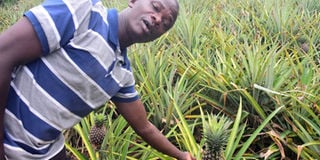Pineapple a game changer for Luwero farmers

Abel Kabari at his four-acre pineapple garden in Bwaziba village, Luwero District . Photo Edgar R Batte
What you need to know:
Pineapple farming is one of the mainly grown cash crops in Luweero. Sulma Foods is adding value to the fruit and exporting it to Japan where it has been well received owing to its organic taste, writes Edgar R. Batte.
If you are to grow pineapples, Abel Kabari advises that you carry out a feasibility to find out if they will do well in your area of choice. They do not do well in wetlands or soggy soil.
Kabari did not have to carry out a feasibility study on the four acres of land on which he grows some 80,000 pineapples, in Luwero District.
How he started
His parents mentored him into pineapple farming and gave him land to till. He is one of the main suppliers of pineapple to Sulma Foods Limited, a company based in Luwero which buys the fruit at Shs2,000 from some 500 farmers united under groups of 20 to 30 people.
Value addition
Sulma Foods, in partnership with Bic Tours Limited, a travel company with specialty in Japanese market, add value to the organic pineapple grown by farmers from Luweero to make dried snacks which they export to Japan. “When we agreed to work together, I sent the first sample to Far East Incorporated Company, a trading company in Japan, and then a second sample. They liked the Ugandan pineapple and requested us to send more,” explains Samuel Mugisha, managing director of Bic Tours.
Exports
At the moment, Sulma Foods exports one tonne of dried fruit every month to the Japanese market through Far East, earning at a total export value $9,000 (about Shs33m) per month.
However, there are oscillations during months depending on harvests. A kilogramme of processed pineapple attracts an average price of $9.5 (Shs33,000) at the factory.
Profits
Depending on the style of planting, Kabari says that a farmer can grow between 16,000 to 20,000 pineapples on an acre of land. At the farm price paid by Sulma, this would ideally earn a farmer between Shs32m to Shs40m. However, the way the farmers keep earning from the fruit is planting pineapple at different times of the year and as such harvest all year which guarantees them a source of livelihood all year around.
From his four acres, Kabari has been able to save money to invest in rental business. He has put up a structure from which he is assured of Shs100,000 every month. He has bought a cow to provide milk to his family and also educated his five children. He spends Shs1.2m on school fees. On his wish list is to acquire more land to plant more pineapple and earn from it. On the whole, pineapple is changing the fortunes of small holder farmers such as Kabari as well as that of the foods and fruits manufacturing company which projects that with Uganda Airlines returning, it will boost export and earn better rates for farmers.
All that is playing into an idea of agro tourism which has taken over in other countries including neighbouring Kenya, where a tourist is able to interact with a farmer and appreciate the initial process of the food they enjoy on their plate in a lodge, hotel or restaurant.
Pineapple as a tourism product
Besides the commercial partnership, Mugisha is promoting pineapple as a snack through gifting it as a souvenir to tourist he hosts as tour operator.
He has developed a tourism product called ‘Pineapple Hunt’ where tourists, both local and foreign, visit farms, learn about the farming processes of planting, growing, agro practices and harvesting.
Luwero is one of Uganda’s biggest pineapple growing areas. During the hunt, tourists are able to harvest pineapple and the challenge is to get the biggest and ripest.
Sulma Foods open their doors to tourists to learn about the processes of drying the pineapple and its packaging. Yumiko Numata, from Far East, was part of the hunt.
“This is real adventure. I have never had a chance to visit a pineapple factory. Today, I have also been able to harvest and taste a lot of fresh pineapple. Such fruits are very expensive in our country yet we are only served a piece,” Numata explains.
Bic Tours started the initiative of find large scale pineapple farmers in Bussi, Wakiso District. When the farmers there could not sustain the projected volumes, Mugisha moved to Luweero to interest Sulma Foods which works with many small holder farmers.
Challenges
According to the Chief Executive Officer of Sulma Foods, Abdu Karim, flight fares are cutting their profit margins.
He is optimistic the revival of Uganda Airlines will help bring down cargo charges to spur more export.
At the moment, Sulma Foods competes with farmers from Philippines and Thailand who use cheaper seawater transport to the same markets the Ugandan company is exporting to, such asLuxemburg, Qatar, Omar and United Arab Emirates (UAE).
“They can afford to sell their fresh fruit and food at half the price we are selling. They can sell at 60 to 80 cents less than we are offering. When we sit down to calculate our margins, it feels like we are working for the airlines,” Karim explains about one of his challenges.
Nonetheless, fruits grown by local farmers such as Kabari, continue to enjoy organic taste given the good soils and natural inputs used during the farming process. As such, the taste remains superior.
Kabari represents the average pineapple farmer in Luweero who operates between an acre to three acres of land.




